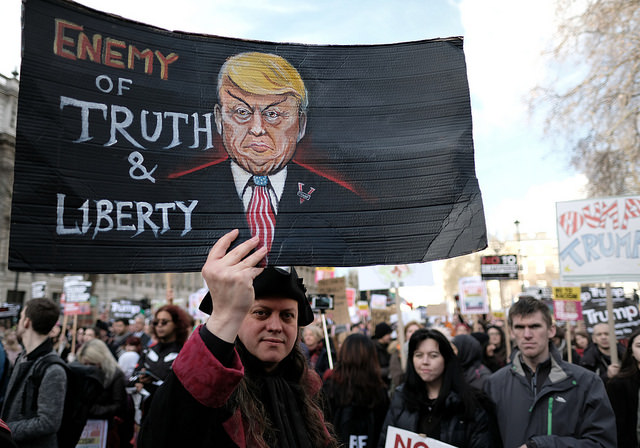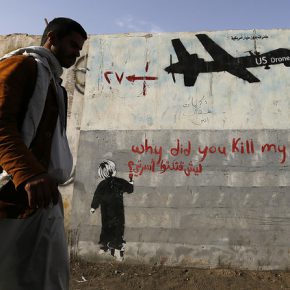The constitutional challenge to Trump’s refugee and travel ban hangs on whether it discriminates against Muslims. Bill Frelick, director of Human Rights Watch’s refugee program, fact-checks the U.S. president’s defense of prioritizing Christian refugees.
NEW YORK – The crux of the constitutional challenge to President Trump’s executive order suspending the U.S. refugee program and barring entry to nationals of seven predominantly Muslim countries is whether he intended to establish a preference for Christians and against Muslims in U.S.immigration and refugee policies.
On February 9, the Ninth Circuit U.S. Court of Appeals said that it was well within the court’s purview to look beyond the text of the executive order itself to discern the president’s intent to favor one religion over another. The court cited the plaintiff’s arguments that there is “evidence of numerous statements by the President about his intent to implement a ‘Muslim ban’ as well as evidence [the plaintiffs] claim suggests that the Executive Order was intended to be that ban,” including the sections of the order relating to refugee admissions.
The evidence provided by the plaintiffs, the States of Washington and Minnesota, included a television interview in which former New York mayor and Trump advisor, Rudolph W. Giuliani, said that Trump asked him to help with the “Muslim ban” by putting together a commission to show him “the right way to do it legally.”
The plaintiffs also pointed to a January 27 interview with the Christian Broadcast Network where Trump said:
“Do you know if you were a Christian in Syria it was impossible, at least very tough to get into the United States? If you were a Muslim you could come in, but if you were a Christian, it was almost impossible and the reason that was so unfair, everybody was persecuted in all fairness, but they were chopping off the heads of everybody but more so the Christians. And I thought it was very, very unfair. So, we are going to help them.”
Let’s break down his statements:
- “If you were a Muslim you could come in.”
If that were the case, most of the approximately 5 million Syrian refugees who have fled their country would now be in the U.S. In fact, Syrian refugees – Muslim or otherwise – can’t just come in. Since the Syrian conflict began in April 2011 through December 2016, the U.S. has admitted just 18,306 Syrians, after extreme vetting and long waits.
- “If you were a Christian, it was almost impossible.”
In fiscal year 2016, the number of Christians (37,347) and adherents of other non-Muslim religions (9,091) exceeded Muslim refugees (38,605) among all nationalities admitted under the U.S. resettlement program, according to State Department statistics. It is true that only a tiny percentage of Syrian Christians were admitted in the last fiscal year: 12,486 Muslims and only 92 Christians, as well as 33 Yazidis and other non-Muslims. But in part that reflects Syrian demography. According to the most recent available statistics issued in November 2015, the country was 87 percent Muslim, 10 percent Christian, 3 percent Druze. Higher proportions of Christian emigration and lower Christian birthrates have very likely shifted the demographic balance since then, but the low percentage might also reflect that resettlement is especially reserved for refugees who have no other options. Many Syrian Christian refugees have been welcomed in Armenia and by the Christian community in Lebanon, or have moved into Greece and other E.U. states where they are ineligible for the U.S. program.
- “They were chopping off the heads of everybody but more so the Christians.”
While no available statistics show ISIS decapitation victims by religion, a logical inference based on available evidence strongly suggests that ISIS has beheaded more Syrian Muslims than Christians: Most Christians in Syria live in government- or Kurdish-controlled areas, and most of those who lived in areas now controlled by ISIS fled in advance of its takeover; because the areas under ISIS control are almost entirely Muslim populated, and because ISIS carries out this atrocity even for minor offenses, it is highly likely that most victims have been Muslim.
While violence in Syria is widespread and few are unaffected, it has overwhelmingly been concentrated in areas of Syria where Sunni Arab populations predominate. Syrian Christians have, indeed, been among the casualties of war, but not on the scale of Sunni Muslims by pro-government forces or Alawites by some opposition armed groups.
- “And I thought it was very, very unfair.”
U.S. officials from the Department of Homeland Security’s U.S. Citizenship and Immigration Services (USCIS) and the State Department’s Bureau of Population, Refugees, and Migration (PRM) make hard choices every day on which refugees to admit. But in the more than 30 years I have spent with Human Rights Watch (HRW) and other independent, nongovernmental organizations working on refugee issues, I have never seen the smallest hint that U.S. officials ever discriminated against Christian refugees – or any other persecuted religious minority, including Muslims. To the contrary,U.S. officials have shown preferences for religious minorities – Soviet Jews, Baha’is from Iran and Christians from Ukraine, Iran, Vietnam, Iraq and many other countries.
- “So, we are going to help them.”
Refugees are defined in international and U.S. law as people with a well-founded fear of being persecuted on any of five grounds: race, religion, nationality, membership in a particular social group, or political opinion. While it is certainly laudable for the U.S. government to protect persecuted religious minorities, there is no reason to favor people persecuted because of their religion over those abused because of their race, for being gay or transgender or for being a political dissident.
With more than 24 million refugees and asylum seekers in the world, the precious few places the U.S. will make available – now capped at 50,000 this fiscal year, less than half of the number President Obama pledged to resettle – should be reserved for the most vulnerable. That includes refugees with the closest ties to the United States, who have not only been persecuted in their home countries but who cannot remain safely in countries of first arrival. They may well have been persecuted for their religion, but that should not be the guiding principle for deciding who is rescued.
This article originally appeared on Refugees Deeply, and you can find the original here. For important news about displacement and forced migration, you can sign up to the Refugees Deeply email list. Photograph courtesy of Alisdare Hickson. Published under a Creative Commons license.





